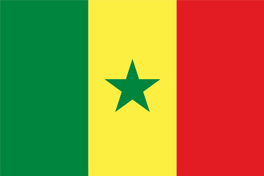 |
République du SénégalIndependence 20 August 1960 - celebrated 4 April
History Over the centuries, Senegal is part of the great socio-political entities such as the Kingdom of Ghana, the Mali Empire, the Jolof Empire and the Songhai Empire. French colonial conquest follows Portuguese and Dutch occupation, and is complete by the end of the 19th century. The country becomes the figurehead of French West Africa (AOF) and produces an intellectual and political elite to which the French Empire grants citizenship. Some of the leaders who work locally and in France for the emancipation of the colonies include Blaise Diagne, who serves in 1914 as the first 'black' African member of the French National Assembly; Léopold Sédar Senghor, the first president – and poet – of the newly independent state in 1960; and Lamine Guèye, responsible for the law conferring French citizenship to 'natives'. Theories of 'Negritude' proposed (around 1930) by Léopold Sédar Senghor, Aimé Césaire and Léon Gontran Damas, and Cheikh Anta Diop's theory (around 1950) concerning ancient Egypt's African roots, still enliven political, literary, ideological and philosophical debates over African identity. During the presidency of René Coty, Senegal votes 'yes' to General de Gaulle's 1958 referendum for a 'common destiny' with France. In 1960, it gains independence, but the pan-Africanist dream is shattered by mistrust of Félix Houphouët-Boigny (Ivory Coast) and competition for power with Modibo Keita (French Sudan, today the Republic of Mali). At the dawn of its independence, when a new Africa is dominated by 'one-party' governance, Senegal is one of the first states to implement political pluralism. Having never experienced a coup d'état, it is often cited as a model of democracy. Ken Ndiaye |


